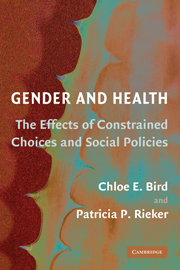Book contents
- Frontmatter
- Contents
- Preface
- Acknowledgments
- Introduction
- 1 Gender Differences in Health
- 2 Gender and Barriers to Health
- 3 National Social Policies and Constrained Choice
- 4 The Impact of Community on Health
- 5 Priorities and Expectations
- 6 Gender and Individual Health Choices
- 7 Opportunities for Change
- Index
- References
Preface
Published online by Cambridge University Press: 05 June 2012
- Frontmatter
- Contents
- Preface
- Acknowledgments
- Introduction
- 1 Gender Differences in Health
- 2 Gender and Barriers to Health
- 3 National Social Policies and Constrained Choice
- 4 The Impact of Community on Health
- 5 Priorities and Expectations
- 6 Gender and Individual Health Choices
- 7 Opportunities for Change
- Index
- References
Summary
The idea for Gender and Health began with our participation in the Society and Health Working Group of the Health Institute at New England Medical Center and the Department of Health and Social Behavior at the Harvard School of Public Health. Our colleagues in this group encouraged us to explore and explain the complex dynamics between gender and health. The task of the cross-disciplinary faculty seminar (organized by Sol Levine and Al Tarlov) was to integrate the relevant concepts and findings from various disciplines to enhance and deepen the understanding of the social determinants of population health (Amick, Levine, Tarlov, & Walsh, 1995). We chose to write this book to encourage biomedical researchers and social scientists to think and work together in new ways to explore the connections between the physiological mechanisms and social processes that make the health of men and women so different.
The gender and health paradox is well documented. Women live longer than men, yet they have higher morbidity rates. Men experience more life-threatening chronic diseases and die younger, whereas women live longer but have more nonfatal acute and chronic conditions and disability. Furthermore, although men's and women's overall rate of serious mental illness is similar, the most common mental health disorders differ by gender. These perplexing patterns raise many questions for social and biomedical scientists and clinicians. At issue is whether the origins of these health differences are physiological, social, or both.
- Type
- Chapter
- Information
- Gender and HealthThe Effects of Constrained Choices and Social Policies, pp. ix - xiiPublisher: Cambridge University PressPrint publication year: 2008



